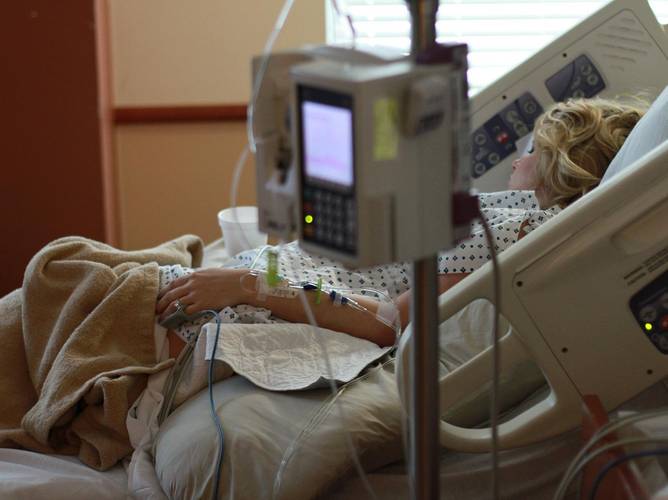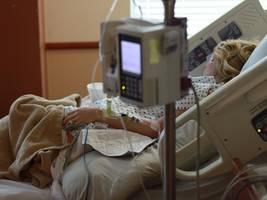The complainant expressed in detail to the Ombudsman his disagreement with the treatment of his mother at the Department of Neurological Diseases at the Maribor University Clinical Centre (department), where she also died. The Ombudsman did not comment on all the details, but he did comment on the complainant's statements and the department's explanations regarding the non-functioning call system and the locking of the department. The Ombudsman determined that the operation of the call system was not adequate, which was also confirmed by the findings of the Commission for Extraordinary Internal Control. The department was locked at certain hours of the day and night, and the key was kept with the staff. The Ombudsman assesses that patients must be guaranteed the possibility of leaving if and when they want it, because otherwise such behaviour can mean a restriction of freedom of movement. The Ombudsman expects the hospital to pay more attention to the proper functioning of the call system and to find a better solution in terms of the possibility of patients leaving the department independently.
* * *
The Ombudsman of the Republic of Slovenia (Ombudsman) was contacted by the complainant who did not agree with the treatment of his mother. The complainant's mother was hospitalised and later died in the Department of Neurological Diseases at the Maribor University Clinical Centre (department). In his letter, the complainant described the circumstances of his mother's treatment, expressed his disagreement with the conduct of the medical staff in this regard, his disagreement with the communication of the department and the hospital with the relatives, and pointed out the inappropriate attitude of the staff towards his mother. The complainant pointed out that the department where his mother was being treated was locked and that the call bells next to the hospital beds did not work during his mother's treatment. After his mother's death, the complainant requested access to her medical records, from which he learned things about her condition that shocked him.
The Ombudsman addressed several inquiries to the department within the scope of his powers. He commented on the statements of the complainant and explanations by the hospitals concerning the non-functioning call system and the locking of the department.
The hospital explained that the call system was working during the hospitalisation of the complainant's mother. The system failure occurred a few months after the complainant's mother was hospitalised. The Commission for Extraordinary Internal Control (Commission), which carried out the control more than six months after the alleged failure of the call system, found that the call devices were still not working or were thought to be working only partially. The hospital also explained that the call system was outdated. When it no longer worked with a voice signal, but only with a light signal, they provided a temporary possibility to call with SOS buttons. Generally, the hospital has a fault reporting system when there is an error in the operation of any device. The department also announced that nurses were to make rounds of all patient rooms every two hours.
Locking down the department, according to the department, is part of ensuring the safety of patients, employees, personal property, and the organisational unit. As they explained, the patient can leave the department whenever they want and if their health condition allows it. The keys are kept by the staff. Upon admission, the patient and their relatives are informed of the institution's house rules, which in Article 5 define that patients are guaranteed day and night rest. Entrances to the department are generally locked during rest periods. Daily rest is the time from lunch to visiting time and night rest between 10 pm and 6 am. The signed consents are interpreted as consent to agree to treatment, which also includes the institution's house rules. Since locking is defined in the house rules, the staff do not record it separately.
The guardian is convinced that the call system is an important safety measure and call bells provide a higher level of patient safety. The Ombudsman found that the call system in the department was not working properly, even though according to the hospital, it was working during the hospitalisation of the complainant's mother. The non-functioning or partial functioning of the call system is also confirmed by the findings of the Commission. If there is a sudden deterioration in the patient's health condition, the call bell is the only contact with help, as the visit by the medical staff every two hours is not sufficient in such cases. The Ombudsman also suggested that the hospital pay special attention to supervision so that the staff do not remove the call bell from a patient who uses it frequently (perhaps unjustifiably, according to the staff's assessment).
Regarding the locking of the department at certain hours of the day and night, from the point of view of the safety of patients (not visitors), the Ombudsman expressed his belief that patients must be guaranteed the possibility to leave the department if and when they wish, because otherwise such behaviour could mean a restriction of the patient’s freedom of movement. According to the ZDZdr, this type of movement restriction is only permissible in psychiatric hospitals on wards under special supervision and in social welfare institutions on secure wards. Physically locking the department could also be controversial from a fire safety point of view, as the key to unlock the door is kept by staff and is not directly accessible to patients. Patients cannot leave the department unless a staff member gives them access to the key. The Ombudsman is, of course, aware that the health condition of the patients must be taken into account.
The Ombudsman assessed the complaint as well-founded. The Ombudsman concluded that the hospital had paid insufficient attention to the operation of the call system, as the call system did not work or only partially worked for more than six months. The Ombudsman also believes that patients must be guaranteed the possibility to leave the department if and when they want to, because otherwise such behaviour may mean limiting the patient's freedom of movement. The Ombudsman expects the hospital to pay more attention to the proper functioning of the call system and to find a better solution in terms of the possibility of patients leaving the department independently. 9.4-32/2022

